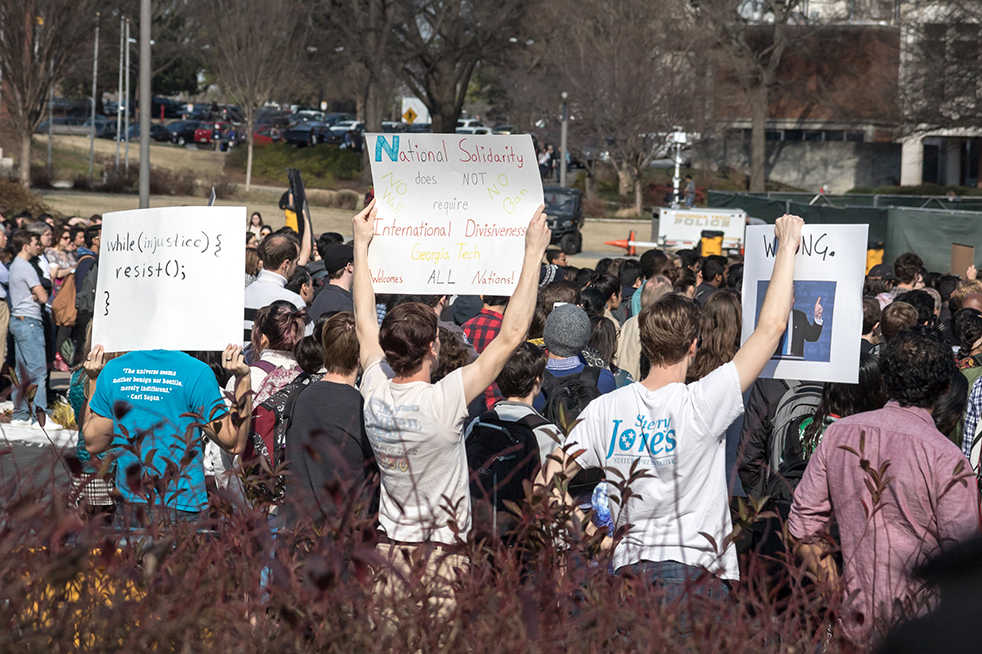An executive order signed by President Trump on Jan. 27, affecting the ability of non-citizens to enter the United States, has prompted responses from students, faculty, staff and administrators at Tech.
Beginning immediately upon the order being signed into law, non-U.S. citizens from Iraq, Iran, Syria, Libya, Sudan, Yemen and Somalia are prohibited from entering the country. According to information from the Office of International Education, this amounts to approximately 117 undergraduate students — the vast majority of whom are from Iran — who would be affected if they attempted to travel outside the United States before April 25. More than 120 employees of Tech are also potentially affected.
President G.P. “Bud” Peterson sent two emails to the student body in the wake of the order, the first including a brief comment and the text of a statement from the Board of Regents and the second including a more personalized statement from Peterson.
The first email consisted primarily of a statement attributed to Steve Wrigley, Chancellor of the Board of Regents, and addressed to University System Presidents. In the letter, he stated that the Board would continue to assess and provide updates on the situation to ensure that the “safety and well being of our campus communities” remains uncompromised by the changes in federal policy. President Peterson added to the Chancellor’s message that Tech was actively monitoring the situation and would provide further information to students on F and J visas on guidance they might find useful.
The Board of Regents could provide no further comment beyond this letter.
The second email came a day later and stressed the “fast-paced and fluid” nature of the order’s implementation, as well as Peterson’s pride in Tech’s international students and their contribution to Tech as a research institute and community.
Several deans from Tech’s colleges sent supplemental emails expressing similar sentiments to students in their respective colleges.
Zvi Galil, dean of the College of Communications, sent his message on Jan. 30 and said that the COC “will provide whatever support we can while complying with USG/GT policy and federal and state law.” Dean Gary May, of the College of Engineering, sent his variation on the email on the morning of Jan. 31 and said that “the College [of Engineering] remains committed to diversity and inclusion, and we continue to value the intellect and talents of scholars from around the world.” Dean Paul Goldbart of the College of Sciences made a statement on Jan. 31, which was posted on the College of Sciences website, and said that “[those connected with the College of Sciences] are ourselves drawn from across the globe, and we are unreservedly committed to welcoming, embracing and supporting people who come to us with a passion for science and mathematics, regardless of origin.”
On Jan. 31, the Undergraduate House of Representatives (UHR) held an open forum concerning the recent executive order banning entry into the country from citizens of seven Middle-Eastern nations. The organizations giving presentations were the Office of International Education (OIE), their International Ambassadors program, College Democrats of Georgia Tech, the Latter-Day Saint Student Association, the Society of Black Engineers and the Muslim Student Association.
Organization representatives presented their concerns and thoughts to UHR through a short speech or presentation, followed by questions from members of UHR. Many organizations asked for the Student Government Association to take action on the order, either by issuing a statement or by promoting inclusivity and tolerance on campus.
Nouha Zaabab, second-year IE and secretary of the Muslim Student Association, encouraged UHR to support affected students and the international student community, saying that “our institute needs to be a leading institute in this respect. … Not only do we boast a large percentage of international students; I know some people from these countries in the executive order, and they are among the best people I know.”
Karvin Dassanayake, third-year CompE and International Ambassadors’ president of marketing, expressed concerns on behalf of several students at Tech following the election.
“Over the last few months,” Dassanayake said, “a lot of students, whether they are international or not, have experienced hateful rhetoric, either very strongly or very subtly.”
Zaabab offered an anecdote concerning these experiences, saying that a “friend was studying in Hong Kong … his friends that are there told him a story about a white, male, Georgia Tech student who was basically venting to one of his friends there about how the only true Americans are white men. I share this just to reiterate while all the support is absolutely amazing … it just shows us that the silent majority is real and people among us that are here at Tech are silently thinking
these terrible things.”
A student-organized solidarity rally took place on Feb. 2 and featured several student and faculty speakers who expressed concern and support for the community affected by the ban.
